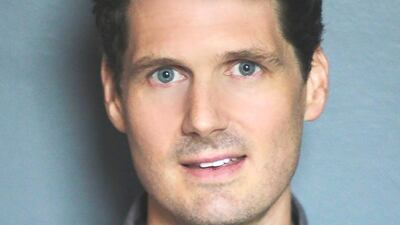When Ben Weeks shows up at Saint James, an exclusive New England boarding school, he has no idea who his roommate will be. A fellow New Englander? Another Connecticut resident? Maybe a Bostonian? Someone who, like him, has long-standing family connections to the school? A fellow squash player? It doesn't cross his mind that his roommate might be a citizen of a country other than the US. He certainly doesn't expect his roommate to be Emirati. After all, Ben hasn't even heard of the Emirates.
Thus begins The Expectations, Alexander Tilney's debut novel. The book is an evocative portrayal of an almost hermetically sealed universe – the Saint James campus circa 1995 – while it is simultaneously a cannily oblique meditation on the wider world. This is thanks in large part to the presence in the narrative of Ben's roommate, Ahmed Al-Khaled.
In constructing Saint James, including its customs, ideals and hypocrisies, Tilney drew extensively on his own experience as a boarding school student. Meanwhile Ben's ecstatic absorption in squash was informed heavily by his own love of the sport. But creating the character of Ahmed meant the American author had to do some research.
“I have a great friend who fled Iran in the early 1980s and ended up in the US,” says Tilney, who lives in New York City. “Our conversations got me interested in all the other places where Iranians had fled, and inspired me to read as much as I could about the Emirates.”
In 2009, as he was beginning work on The Expectations, Tilney flew to the UAE to see the country for himself. Tilney roamed Abu Dhabi and Dubai from sunrise to sunset, taking in the atmosphere of high-speed change, while scribbling notes about a nation adapting rapidly to shifting arrangements of opportunity and power.
Over time – and "many, many drafts" – Tilney says he realised that bringing an Emirati character to Saint James would be the perfect way to explore the novel's core themes. Tilney says there is a fundamental rot at the heart of his Saint James, perpetuated in part by the school's unwillingness to examine itself as a zone – and perpetuator – of unearned privilege. It's the school's open secret, what everyone knows but won't say.
But Ahmed is an outsider to all of this. Like Ben, he shows up at Saint James with an idealised vision of the school, but the two boys' visions diverge at least as much as they overlap. While Ben is looking forward to a new social life, one free from self-consciousness and self-doubt, full of grand adventures and new friends – and perhaps even girlfriends – Ahmed's ambitions have more to do with learning to be a leader. His father, we learn, got rich by helping to plan the construction of the Port of Jebel Ali. With the 20th century drawing to an end and the Emirates becoming more enmeshed in the international economy by the day, he is eager for his son to play a role in the country's global future.
Why Saint James? Because one of Ahmed's father's closest non-Emirati collaborators – an American businessman known for his plain-spoken honesty – attended the school. Much of Ahmed's narrative arc consists of his realisation that, however much Saint James claims to be about noble leadership ideals, there's a great deal more going on behind the curtain.
After returning to New York at the end of his Dubai visit, Tilney contacted an Emirati man who attended college in the US and asked him for details about his encounter with America by way of an educational institution. This source is thanked in the book's acknowledgements.
Ben and Ahmed make a perfect dramatic duo for the book: they help each other, they hurt each other and they serve as a painful mirror for the other's flaws.
At the novel's powerfully ambiguous ending, which does not feel at all incomplete, the reader can't be sure whether the roommates are still friends, or even if they will both remain at Saint James for another year. But we learn that they each know a bit more about themselves, and about the complexities of the world they share.
Tilney says he hopes to return to the Emirates soon. In the meantime, he says he is hopeful that book lovers in the UAE will find their way to The Expectations and Ahmed, a character the author is deeply fond of.
"In America, I think, the coverage is mostly going to be about this being a boarding school novel," Tilney says. "But I really want people to know about Ahmed, too. I fell in love with so many characters in the book, but I really fell in love with Ahmed. His story is so important to me, and I hope that comes through."
The Expectations, published by Little, Brown and Company, is out now


